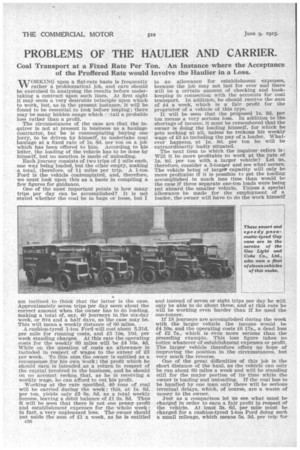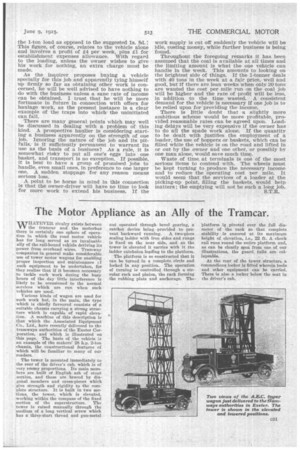PROBLEMS OF THE HAULIER AND CARRIER.
Page 14

Page 15

If you've noticed an error in this article please click here to report it so we can fix it.
Coal Transport at a Fixed Rate Per Ton. An Instance where the Acceptance of the Proffered Rate would Involve the Haulier in a Loss.
WORKING upon a flat-rate basis is frequently rather a problematical job, and care should be exercised in analysing the results before undertaking a contract upon such lines. At first sight it may seem a very desirable principle upon which to work, but, as in the present instance, it will be found to be essential to look before leaping ; there may be many hidden snags which —.fail a probable loss rather than a profit.
The circumstances of the case are that the inquirer is not at present in business as a haulage contractor, but he is contemplating buying one lorry, to be driven by himself, to undertake coal haulage at a fixed rate of 1s. 8d. per ton on a job which has been offered to him. According to his letter, the loading of the vehicle has to be done by himself, but no mention is made of unloading. Each journey consists of two trips of mile each, One way being loaded, but the other empty, making a total, therefore, of i miles per trip. A 1-ton Ford is the vehicle contemplated, and, therefore, we must look upon this as a basis in compiling a few figures for guidance. One of the Most important points is how many trips per day can be accomplished? It is not stated whether the coal be in bags or loose, but I am inclined to think that the Tatter is the case. Approximately seven trips per day seem about the correct amount when the owner has to do loading, making a total of, say, 40 journeys in the six-day week, or five and a half days, as the case may be. This will mean a weekly distance of 60 miles.
A cushion-tyred 1-ton Ford will cost about 3.31d. per mile for running costs, and £3 19s. 10d. per week standing charges. At this rate the operating costs for the weekly 60 miles will be £4 16s. 4d. While on the question of costs an allowance is included In respect of wages to the extent of £3 per week. To this sum the owner is entitled as a recompense for his own work ; the profit which he should earn is intended as a return in respect of the capital involved in the business, and he should on no account reckon that, as he is receiving a weekly wage, he can afford to cut his profit.
Working at the rate specified, 40 tons of coal will be carried during the week ; this, at 1s. 8d. per ton, yields only £3 6s. Sd. as a total weekly Income, leaving a debit balance of £1 Ds. 8d. Thus ft will be seen that there is not one penny profit and establishment expenses for the whole week : in fact. a very unpleasant loss. The owner should put aside the sum of fl a week, as he Is entitled c30 to an allowance for establishment expenses, because the job may not last for ever and there will be a certain amount of checking and bookkeeping In connection with the accounts for coal transport. In addition, he should receive the sum of 14 a week, which is a fair profit for the proprietor of a vehicle of this type. It will be seen that the proposed 1s. 8d. per ton means a very serious loss. In addition to the shortage of income, it must be remembered that the owner is doing the loading himself, for which he gets nothing at all, unless he reckons his weekly wage of 13 as including the pay of a loader. Whatever happens, at 1s. 8d. per ton he will be extraordinarily badly situated. The next item to which the inquirer refers is : Will it be more profitable to work at the rate of 1s. 8d. per ton with a larger vehicle? Let us, therefore, consider a 3-tonner and see what occurs. The vehicle being of larger capacity will only be more profitable if it is possible to get the loading accomplished in much less time than would be the case if three separate one-ton loads were being put aboard the smaller vehicle. Unless a special allowance be made for the employment of a loader, the owner will have to do the work himself and instead of seven or eight trips per day he will only be able to do about three, and at this rate he will be working even harder than if he used the one-tonner.
If 18 journeys are accomplished during the week with the larger vehicle the income would be £4 10s. and the operating costs 16 17s., a dead loss of £2 7s., which is even more serious than the preceding example. This loss figure takes no notice whatever of establishment expenses or profit. The larger vehicle therefore offers no hope of Improving the position in the circumstances, but very much the reverse.
One of the great difficulties of this job is the short distance of the haul, as the vehicle can only be run about 60 miles a week and will be standing still for the major portion of its time while the owner is loading and unloading. If the coal has to be handled by one man only there will be serious terminal delays, which, of course, are a waste of money to the owner.
Just as a comparison let us see what must be charged in order to earn a fair profit in respect of the vehicle. At least 3s. 64. per mile must be charged for a cushion-tyred 1-ton Ford doing such a small mileage, which means 5s. 3d. per trip for the 1-ton load as opposed to the suggested is. 84.: This figure, of course, relates to the vehicle alone and involves a profit of £4 per week, plus £1 for establishment expenses allowance. With regard to the loading, unless the owner wishes to give his work for nothing, an extra charge must be made.
As the inquirer proposes buying a vehicle specially for this job and apparently tying himself up firmly so far as obtaining other work is concerned, he will be well advised to have nothing to do with the business unless a sane rate of income can be obtained. I trust that he will be more fortunate in future in connection with offers for haulage work, as the present instance is a clear example of the traps into which the uninitiated can fall, There are many general points which may well be discussed in dealing with a problem of this kind. A prospective haulier is considering starting a business apparently on the strength of one job. Ignoring the nature of the job and its pitfalls, is it sufficiently permanent to warrant its use as the basis of a business? As a rule, it is somewhat risky to put all one's eggs into one basket, and transport is no exception. If possible, it is best to have a group of promised jobs to handle, even small ones, in preference to one larger one. A sudden stoppage for any reason means serious loss.
A point to be borne in mind in this connection is that the owner-driver will have no time to look for more work to extend his business. If the work supply is cut off suddenly the vehicle will be idle, costing money, while further business is being found. , Throughout the foregoing remarks it has been assumed that the coal is available at all times and the limiting amount is what the one vehicle can handle in the week. This amounts to looking on the brightest side of things. If the 1-tonner deals with 40 tons in the week at a fair price, well and good, but if there are lean weeks when only 20 tons are wanted the cost per mile run on the coal job will be higher and the rate of profit will be less, in addition to the time wasted. A consistent demand for the vehicle is necessary If one job is to be relied upon for providing the income.
There is little doubt that a slightly more ambitious scheme would be more profitable, provided reasonable rates can be agreed upon. Loading delays will be very expensive if the owner has to do all the spade work alone. If the quantity to be dealt with justifies the employment of a loader, the use of hoppers or baskets, which can be filled while the vehicle is on the road and lifted in or out by the owner and one other, or possibly by one man alone, would save much time.
Waste of time, at terminals is one of the most serious items to contend with. The wheels must be kept turning to produce the necessary income and to reduce the operating cost per mile. It would seem that the services of a loader at the picking-up point, filling the baskets, would help matters; the emptying will not be such a long job.
S.T.R.






























